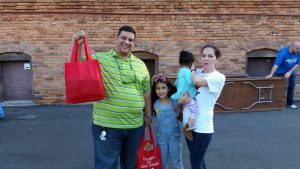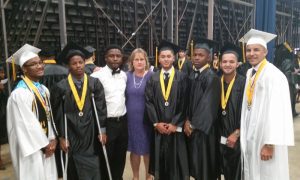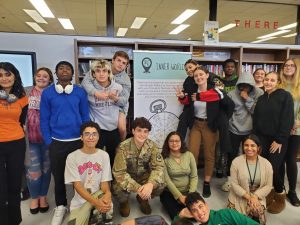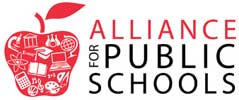Recently, Voyage Tampa met with Alliance for Public Schools Executive Director Melissa Erickson to talk about the Alliance’s work to champion students, educators, and public education. Here’s the interview:
Alright, so thank you so much for sharing your story and insight with our readers. To kick things off, can you tell us a bit about how you got started?
My passion for meaningful family and stakeholder engagement in schools stems from my own multifaceted experiences. As the daughter of a teacher turned administrator and a dedicated school volunteer turned board member, I witnessed firsthand how students thrive when families and communities actively participate in education.
After serving three impactful years as President of the Hillsborough County Council PTA/PTSA, I recognized a pressing need for innovative programming to empower families amid major policy shifts. This was an era of rapid change, with Empowering Effective Teachers grants transforming classrooms and Common Core adoption leaving many parents confused. Families needed support navigating school choice systems and advocating for their children on issues dictated at the state level.
In hopes of filling this gap, I co-founded the Alliance for Public Schools in 2012 alongside Christine Bramuchi and Linda Kobert. We began by delivering family engagement sessions across Hillsborough County focused on decoding complex education policies and fostering student success through community collaboration. As demand grew, we expanded our programming to six more Florida counties and now serve in a few districts nationwide.
 Along the way, students expressed a desire to lead efforts affecting their schools. This inspired us to develop youth-led initiatives for improving graduation rates, school climate, and campus culture. By elevating student voices, we evolved beyond a purely family-focused mission into a broader stakeholder empowerment organization.
Along the way, students expressed a desire to lead efforts affecting their schools. This inspired us to develop youth-led initiatives for improving graduation rates, school climate, and campus culture. By elevating student voices, we evolved beyond a purely family-focused mission into a broader stakeholder empowerment organization.
Throughout my career, I have held roles that ingrained in me holistic support for student outcomes. One such role was Academic Specialist for the Florida Kinship Center at the University of South Florida. There, I collaborated with school personnel and center-based social workers in wraparound services engaging families and communities to back academic goals. My time managing parental involvement programs at Family First also shaped my vision of inclusive family engagement programming.
While launching this organization was challenging, our commitment never wavered. We filled an unmet need for an independent entity cultivating family and community alliances to bolster public education. Over the past decade, our flexible, responsive approach has empowered countless stakeholders to drive systemic impact. Though the path was not obvious early on, I cannot imagine more urgent or fulfilling work.
 Would you say it’s been a smooth road, and if not, what are some of the biggest challenges you’ve faced along the way?
Would you say it’s been a smooth road, and if not, what are some of the biggest challenges you’ve faced along the way?
When I co-founded this non-profit education organization, I underestimated the demands involved in getting a new initiative off the ground. Securing consistent funding has been an ongoing challenge as many worthy organizations compete for donor funds. With limited resources, it has also been difficult to scale our programming and staff to match the level of need within the communities we serve.
Developing relevant, high-impact student and family programs has also necessitated continual evolution. As the organization has grown, we have worked diligently to expand offerings while maintaining quality. This requires constantly assessing trends and pain points, piloting new approaches, evaluating effectiveness, and modifying established programs to better meet emerging needs. It has been a complex iterative process requiring strong community ties to shape programming.
Arguably our biggest obstacle emerged with the COVID-19 pandemic which destabilized many of our existing program delivery mechanisms. With students sent home for remote learning, everything from tutoring sessions to leadership development programs had to be reimagined for a virtual context. This was tremendously taxing on our small staff. Meanwhile, students and families in our community faced amplified stressors from health risks to job losses. Mental health needs and academic skill gaps ballooned during the pandemic. Our programming had to adapt at warp speed to provide crucial support.
Evolving dynamics around family engagement in schools has also impacted our work. While families have always been seen as key stakeholders in education, ideological debates and political divides have raised tensions between parents and school districts. More hesitancy and weariness now shape some interactions with families.
However, we continue to believe deeply in the value of equitable, culturally responsive family partnerships. Finding ways to bridge gaps, share power, and maintain trusting relationships remains central to our mission no matter the political climate. By persisting through all these varied challenges over the past several years, the Alliance has become more resilient, responsive, and dedicated to empowering students, families, and communities.
Alright, so let’s switch gears a bit and talk business. What should we know about your work?
An experienced educator and advocate have a passion for stakeholder engagement & community investment in public schools.
I have collaborated closely with leaders in school districts, representing over 1 million students, to enhance meaningful family participation in support of their children’s education. Additionally, I have led and contributed to various local, state, and national advocacy campaigns dedicated to supporting our public schools and the dedicated educators who serve our students.
 I take pride in my diverse experience working with students in K-12 and higher education. I have consistently championed equitable access to academic success, as well as college and career pathways, for all students. As a non-profit leader, my primary commitment is to facilitate connections between educators, schools, districts, and families, to ensure optimal support for students.
I take pride in my diverse experience working with students in K-12 and higher education. I have consistently championed equitable access to academic success, as well as college and career pathways, for all students. As a non-profit leader, my primary commitment is to facilitate connections between educators, schools, districts, and families, to ensure optimal support for students.
My career in education began as a Fellow for the National Science Foundation, where I researched teaching and learning, with a particular focus on attracting underrepresented populations, including females, to advanced STEM classes at the secondary and college levels. This work ignited my passion for equity, which continues to drive my professional endeavors today.
After holding leadership roles at the local, state, and national levels of the PTA, I transitioned my focus from classroom practice to family and community engagement. I have also been involved in initiatives such as the Common Core States Standards campaign and the Empowering Effective Teaching Initiative of the Bill & Melinda Gates Foundation. In recognition of my contributions, I was selected as the representative of the public to the Commission on Standards and Performance Reporting for the Council for the Accreditation of Education Preparation.
I have been honored to receive prestigious accolades, including being recognized as a White House Champion of Change by the Obama administration and an American Graduate Champion by PBS. I have also been acknowledged as a Community Builder by the FBI Citizens Academy and a Tampa Bay Lightning Community Hero. Additionally, I hold lifetime memberships in both Florida and the National PTA, reflecting my enduring commitment to advocating for children and families.
If you had to, what characteristic of yours would you give the most credit to?
The ability to evolve and adapt our programming while staying true to the mission of supporting families, our public schools, and the students they serve. Over the last 12 years, numerous challenges that have threatened our ability to serve students as a small non-profit. Funding and resources have been limited, which has impacted the services we can provide. Additionally, there has been turnover in district leadership in the collaborating school districts we work with. This lack of continuity requires continual work to build trust and adapt programming to district objectives while meeting the needs of families and students.
Most recently, the COVID-19 pandemic forced dramatic changes and disruptions to education. Since we focus on building community support for public schools and connections between home and school, the conditions of the pandemic required many adjustments to programming. All of this took a toll on students’ academic, social, and emotional growth and has necessitated different approaches in both our family engagement and student leadership work.
The political debates that have emerged locally and nationwide regarding “parents’ rights” in schools have also proved challenging and have required expertise in working with families across the political spectrum by keeping the focus on student success. Polarized views on issues like curriculum, library books, and inclusion policies have increased tensions between families and school districts. This makes our work to bring communities together for the benefit of students more complex.
Despite these ongoing hurdles, we continue to adapt so we can deliver on our mission. By listening carefully to the diverse needs and perspectives of stakeholders – students, families, educators, and community members – we find ways to move forward. We have redesigned elements of our programs to provide more flexible options.
We have strengthened partnerships with other community organizations to maximize resources. And we have redoubled our efforts to help students succeed, both inside and outside the classroom. Though the path has not been easy, our commitment has remained the same over the last 12 years: to support student empowerment, wellness, leadership development, and community connectedness.







